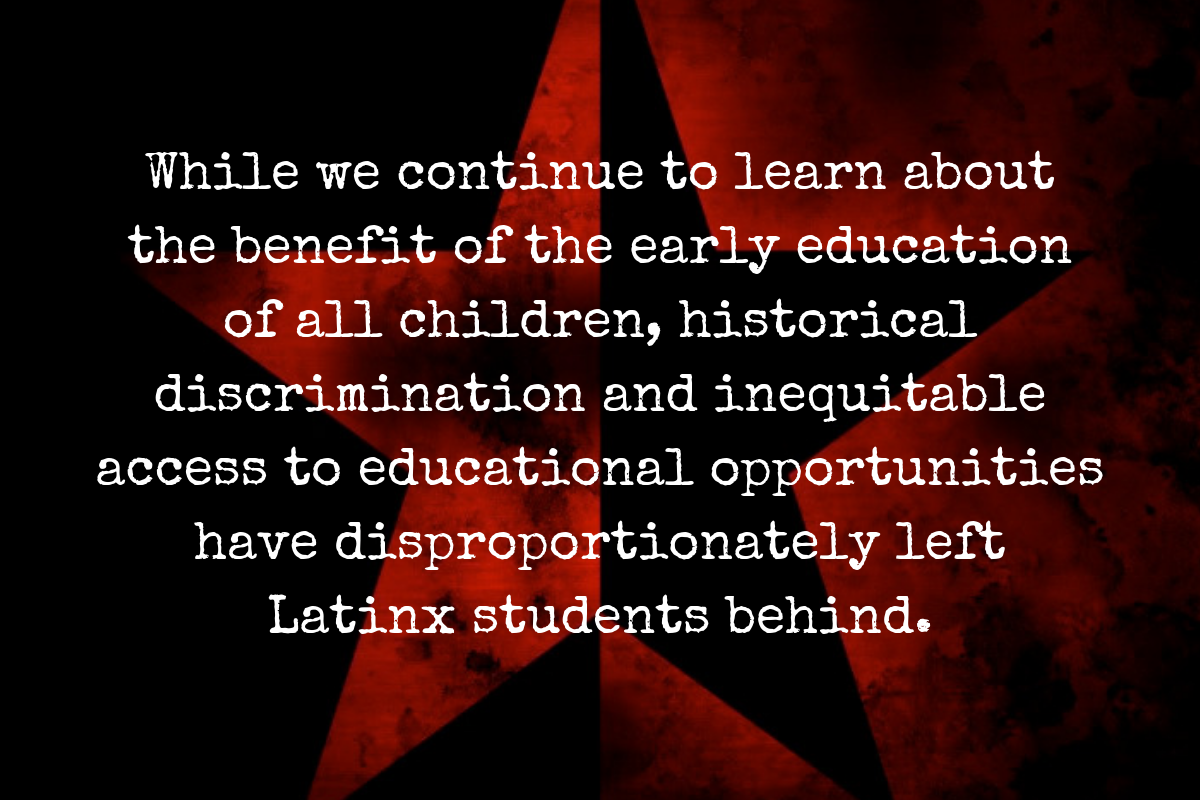
By Olga M. Hickman, Ph.D.
While the government threatens to ship thousands of Latinx immigrants to sanctuary cities, we need to pay attention to another threat to children already here: We are not ensuring that Latinx-American children are getting an equal shot in schools.
Donald Trump’s budget proposal for Fiscal Year (FY) 2020 presents massive cuts to programs that are critical to helping children and families. Cuts in funding for education would impact some of the nation’s youngest and most vulnerable, children from disadvantaged backgrounds. This is a particularly disturbing vision that would ultimately increase income inequality and widen racial disparities for the nation’s Latinx population.
When, at age 5, I walked into kindergarten at Lucille Pearson Elementary School, I arrived with an advantage over my peers and my siblings who had attended the same school and were taught by the same teachers. While I grew up in the same 960-square foot home my three siblings had inhabited, was raised by the same parents, and survived the same trauma, I was fortunate to have an opportunity that they didn’t—a quality early childhood experience that was afforded to poor kids that didn’t speak any English. I attended Head Start from ages three to five, and while no formal research has been done on me specifically, I attribute my academic success to the early childhood development opportunities I had.
Over time, Latinx communities have faced inequities in education, including adequate funding for programs that promote school readiness. Latinx children have often attend schools with less than adequate resources, and lack of access to educational services during their formative years. Consequently, Latinx children are less likely than their peers from other ethnic groups to enroll in early childhood programs, largely in part to limited access. According to the National Center for Education Statistics, in 2017, Latinos had the lowest percentage of three to five-year-old students enrolled in early childhood education programs. While 43% of Black children and 41% of White children were enrolled preschool programs, the percentage of Latinx children enrolled in the same programs was only 31%.
While we continue to learn about the benefit of the early education of all children, historical discrimination and inequitable access to educational opportunities have disproportionately left Latinx students behind. The lack of access to participation in high quality early education means that not all Latinx children enter school ready to learn. In fact, a 2017 study by the Robert Wood Johnson Foundation found that only 40% of four-year-old Latinx children are enrolled in early childhood centers, compared to 53% of their white peers.
Every day scientists tell us more about the huge brain developments that occur during a child’s formative years. Nobel Prize-winning economist James Heckman argues that investing in ages 0 to 5, as opposed to later ages, provides the greatest return to students’ future incomes. Access to high-quality early childhood education can help ensure that children from disadvantaged backgrounds perform better in school, lead healthier lifestyles, and are more emotionally and socially prepared as adults. Investing in our youngest children to thrive and develop to their full potential, now and in the future, ensures favorable social and economic outcomes for our society.
Attendance in high quality early education improves academic and economic outcomes for Latinos. When children enter school ready to learn, they are more likely to follow an educational path that promotes academic achievement—keeping them on track in school and economic future. We know that when children begin school ready to learn, they are more likely to act as active participants in a more successful workforce.
In fact, research from the University of Texas at San Antonio shows that investing in high-quality early education of Latinos improved social and economic outcomes. Similarly, experts project that when there is limited access to such programming, the make-up of our working workforce will not match the needs of the future economy. High quality early education programs targeted to serve our most vulnerable children have proved not only to improve school readiness, but to reduce drop-out rates, increase high school graduation and college enrollment. Investing in the early education of Latinx children can help ensure that their continued marginalization can be disrupted, and they can begin to show a stronger force of productivity in the workforce. Not only can such programs support early gains, but the access to high-quality early education provides important support to the workforce that provides parents the ability to enter the workforce and be productive.
While the make-up of the U.S. population has changed, equitable access to early childhood education for Latinx students continues to be a challenge. Concerns about the educational attainment of Latinx children in the U.S. should bring renewed focus to the critical role that high quality early education instruction plays in changing educational outcomes.
Already only 14% of public education dollars are spent on developing our youngest assets. Slashing funding to early childhood education would continue to marginalize the Latinx community. It is necessary to understand that in order for Latinos to achieve economic and social prosperity, they must have access to the same opportunities that are afforded to their peers. Our country will reap the benefits of demographic that has changed, and will only continue to grow, by ensuring that increased investments in quarry early childhood education are afforded to all.
***
Olga M. Hickman, Ph.D., is executive director of Bachman Lake Together, a nonprofit working to improve early childhood education in a Dallas neighborhood where 74 percent of families speak Spanish as their primary language and 90 percent of elements school students receive free or reduced lunch. Dr. Hickman is a Public Voices Fellow of the OpEd Project



[…] It’s Not Because They Are Poor, It’s Because They Are Brown: The Inequity of Limiting Funds to H… (Olga Hickman) […]